Mental Health Assessment: Interview, Skills, and Interventions Report
VerifiedAdded on 2021/04/19
|10
|2055
|161
Report
AI Summary
This report provides a comprehensive analysis of a mental health assessment scenario, emphasizing the critical role of interpersonal skills in nurse-patient interactions. It explores effective communication techniques such as active listening, reflection, and non-verbal cues. The report identifies sympt...
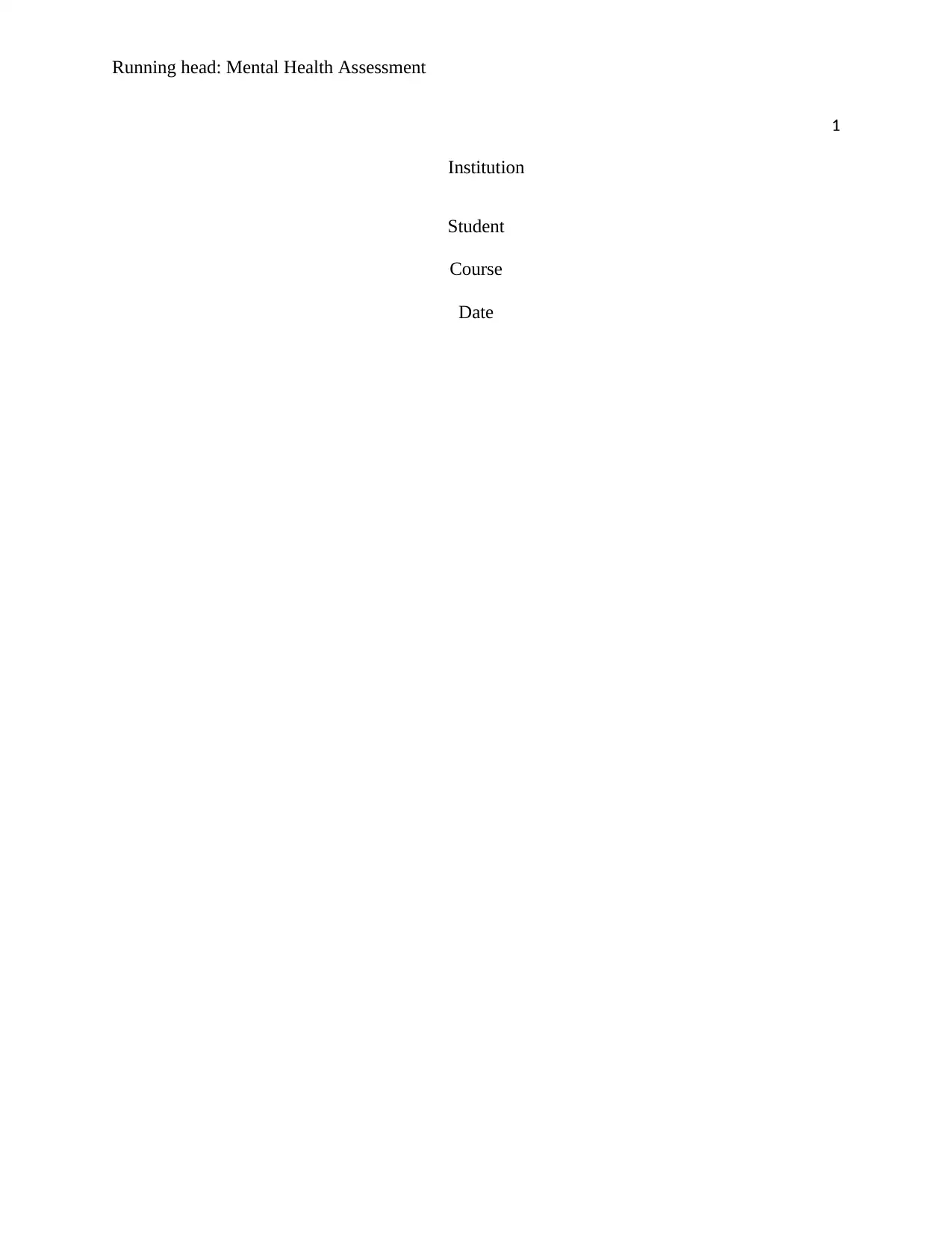
Running head: Mental Health Assessment
1
Institution
Student
Course
Date
1
Institution
Student
Course
Date
Paraphrase This Document
Need a fresh take? Get an instant paraphrase of this document with our AI Paraphraser
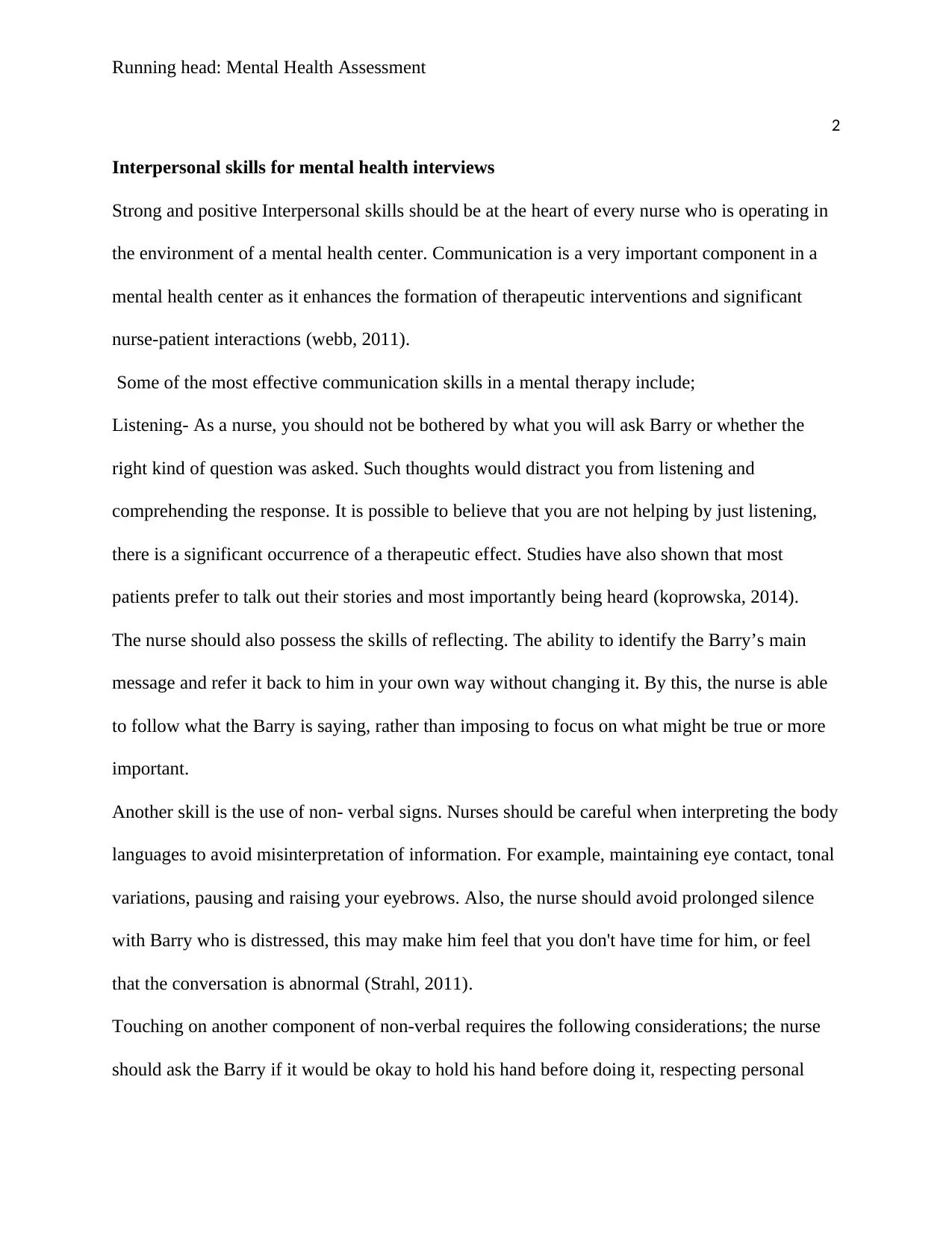
Running head: Mental Health Assessment
2
Interpersonal skills for mental health interviews
Strong and positive Interpersonal skills should be at the heart of every nurse who is operating in
the environment of a mental health center. Communication is a very important component in a
mental health center as it enhances the formation of therapeutic interventions and significant
nurse-patient interactions (webb, 2011).
Some of the most effective communication skills in a mental therapy include;
Listening- As a nurse, you should not be bothered by what you will ask Barry or whether the
right kind of question was asked. Such thoughts would distract you from listening and
comprehending the response. It is possible to believe that you are not helping by just listening,
there is a significant occurrence of a therapeutic effect. Studies have also shown that most
patients prefer to talk out their stories and most importantly being heard (koprowska, 2014).
The nurse should also possess the skills of reflecting. The ability to identify the Barry’s main
message and refer it back to him in your own way without changing it. By this, the nurse is able
to follow what the Barry is saying, rather than imposing to focus on what might be true or more
important.
Another skill is the use of non- verbal signs. Nurses should be careful when interpreting the body
languages to avoid misinterpretation of information. For example, maintaining eye contact, tonal
variations, pausing and raising your eyebrows. Also, the nurse should avoid prolonged silence
with Barry who is distressed, this may make him feel that you don't have time for him, or feel
that the conversation is abnormal (Strahl, 2011).
Touching on another component of non-verbal requires the following considerations; the nurse
should ask the Barry if it would be okay to hold his hand before doing it, respecting personal
2
Interpersonal skills for mental health interviews
Strong and positive Interpersonal skills should be at the heart of every nurse who is operating in
the environment of a mental health center. Communication is a very important component in a
mental health center as it enhances the formation of therapeutic interventions and significant
nurse-patient interactions (webb, 2011).
Some of the most effective communication skills in a mental therapy include;
Listening- As a nurse, you should not be bothered by what you will ask Barry or whether the
right kind of question was asked. Such thoughts would distract you from listening and
comprehending the response. It is possible to believe that you are not helping by just listening,
there is a significant occurrence of a therapeutic effect. Studies have also shown that most
patients prefer to talk out their stories and most importantly being heard (koprowska, 2014).
The nurse should also possess the skills of reflecting. The ability to identify the Barry’s main
message and refer it back to him in your own way without changing it. By this, the nurse is able
to follow what the Barry is saying, rather than imposing to focus on what might be true or more
important.
Another skill is the use of non- verbal signs. Nurses should be careful when interpreting the body
languages to avoid misinterpretation of information. For example, maintaining eye contact, tonal
variations, pausing and raising your eyebrows. Also, the nurse should avoid prolonged silence
with Barry who is distressed, this may make him feel that you don't have time for him, or feel
that the conversation is abnormal (Strahl, 2011).
Touching on another component of non-verbal requires the following considerations; the nurse
should ask the Barry if it would be okay to hold his hand before doing it, respecting personal
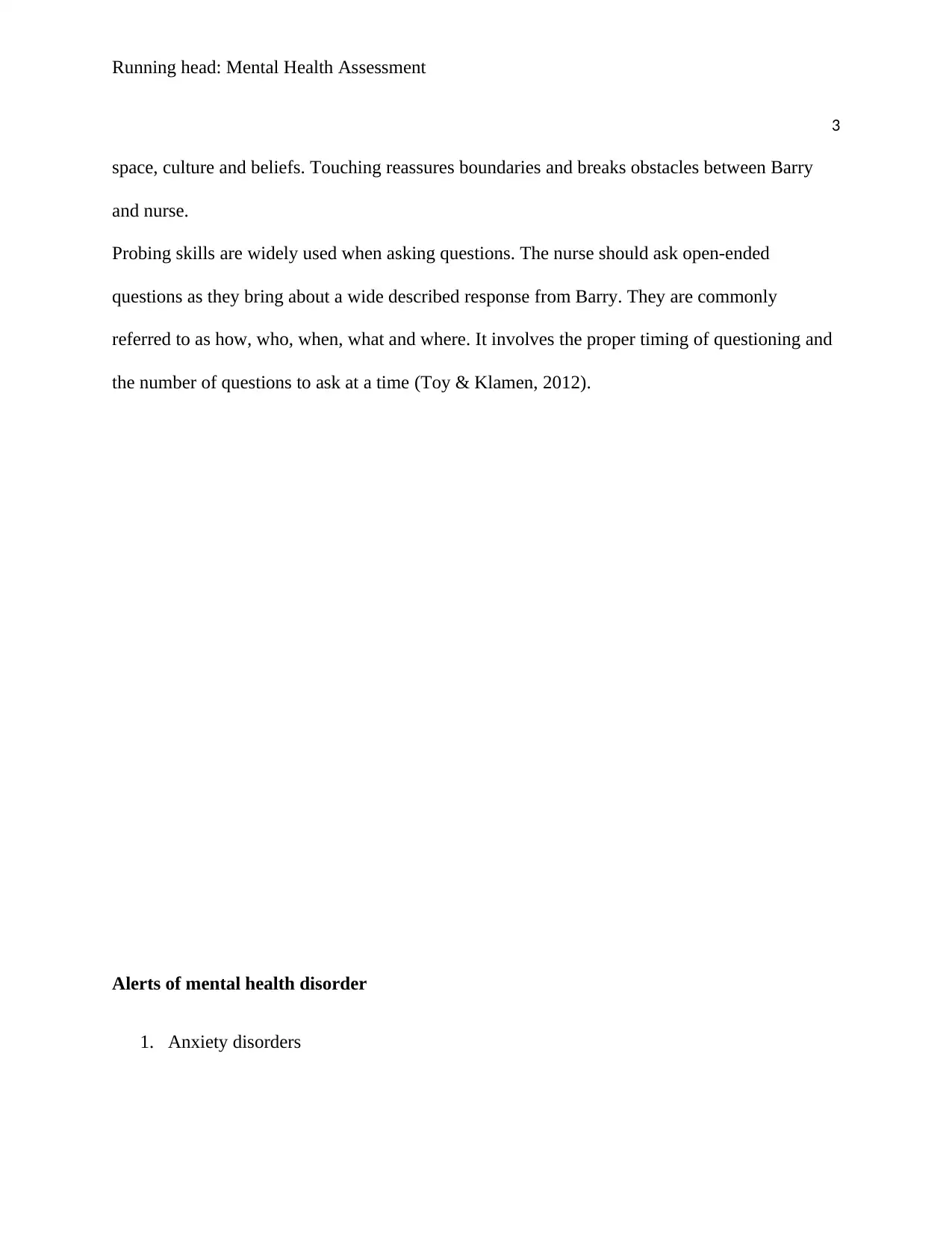
Running head: Mental Health Assessment
3
space, culture and beliefs. Touching reassures boundaries and breaks obstacles between Barry
and nurse.
Probing skills are widely used when asking questions. The nurse should ask open-ended
questions as they bring about a wide described response from Barry. They are commonly
referred to as how, who, when, what and where. It involves the proper timing of questioning and
the number of questions to ask at a time (Toy & Klamen, 2012).
Alerts of mental health disorder
1. Anxiety disorders
3
space, culture and beliefs. Touching reassures boundaries and breaks obstacles between Barry
and nurse.
Probing skills are widely used when asking questions. The nurse should ask open-ended
questions as they bring about a wide described response from Barry. They are commonly
referred to as how, who, when, what and where. It involves the proper timing of questioning and
the number of questions to ask at a time (Toy & Klamen, 2012).
Alerts of mental health disorder
1. Anxiety disorders
⊘ This is a preview!⊘
Do you want full access?
Subscribe today to unlock all pages.

Trusted by 1+ million students worldwide
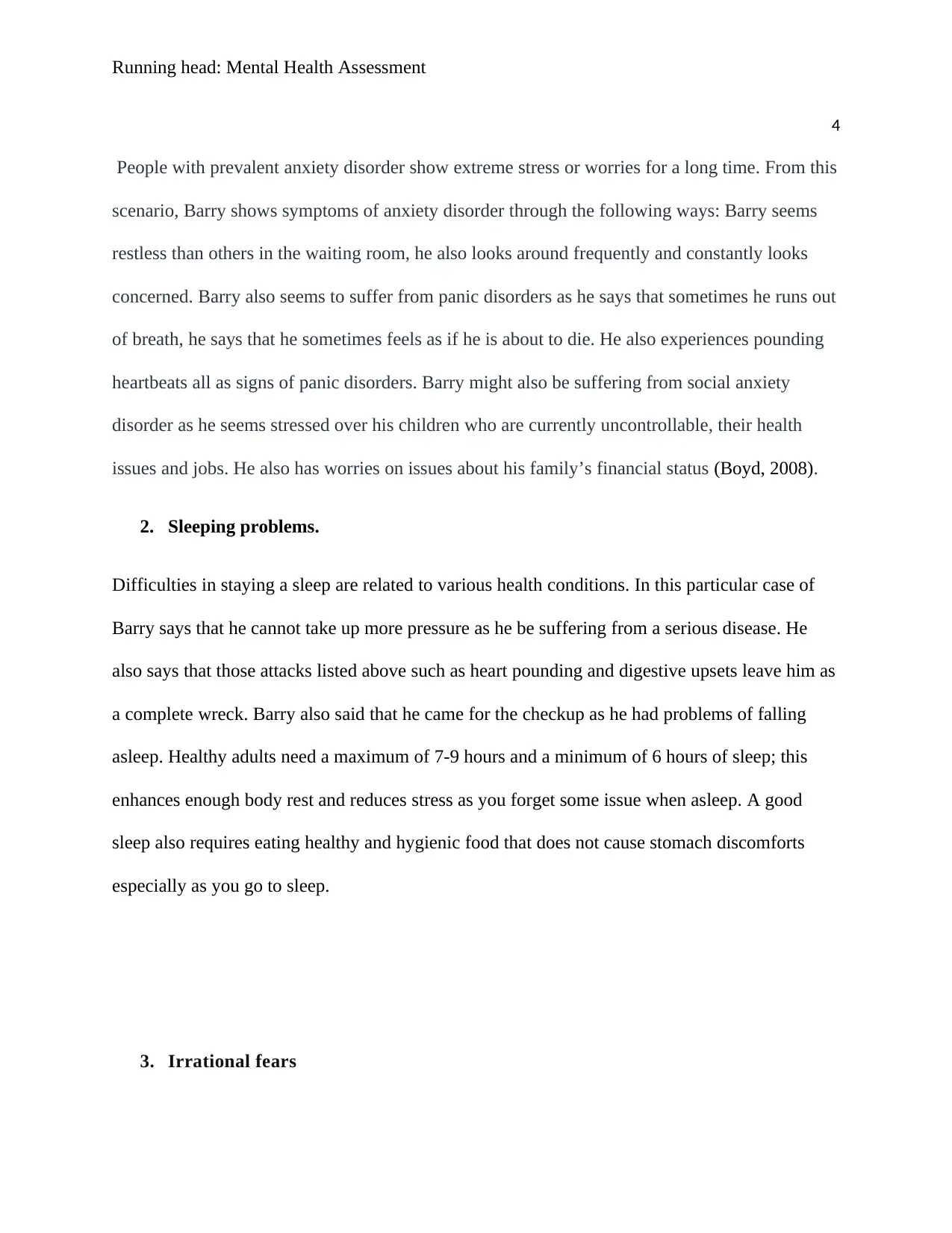
Running head: Mental Health Assessment
4
People with prevalent anxiety disorder show extreme stress or worries for a long time. From this
scenario, Barry shows symptoms of anxiety disorder through the following ways: Barry seems
restless than others in the waiting room, he also looks around frequently and constantly looks
concerned. Barry also seems to suffer from panic disorders as he says that sometimes he runs out
of breath, he says that he sometimes feels as if he is about to die. He also experiences pounding
heartbeats all as signs of panic disorders. Barry might also be suffering from social anxiety
disorder as he seems stressed over his children who are currently uncontrollable, their health
issues and jobs. He also has worries on issues about his family’s financial status (Boyd, 2008).
2. Sleeping problems.
Difficulties in staying a sleep are related to various health conditions. In this particular case of
Barry says that he cannot take up more pressure as he be suffering from a serious disease. He
also says that those attacks listed above such as heart pounding and digestive upsets leave him as
a complete wreck. Barry also said that he came for the checkup as he had problems of falling
asleep. Healthy adults need a maximum of 7-9 hours and a minimum of 6 hours of sleep; this
enhances enough body rest and reduces stress as you forget some issue when asleep. A good
sleep also requires eating healthy and hygienic food that does not cause stomach discomforts
especially as you go to sleep.
3. Irrational fears
4
People with prevalent anxiety disorder show extreme stress or worries for a long time. From this
scenario, Barry shows symptoms of anxiety disorder through the following ways: Barry seems
restless than others in the waiting room, he also looks around frequently and constantly looks
concerned. Barry also seems to suffer from panic disorders as he says that sometimes he runs out
of breath, he says that he sometimes feels as if he is about to die. He also experiences pounding
heartbeats all as signs of panic disorders. Barry might also be suffering from social anxiety
disorder as he seems stressed over his children who are currently uncontrollable, their health
issues and jobs. He also has worries on issues about his family’s financial status (Boyd, 2008).
2. Sleeping problems.
Difficulties in staying a sleep are related to various health conditions. In this particular case of
Barry says that he cannot take up more pressure as he be suffering from a serious disease. He
also says that those attacks listed above such as heart pounding and digestive upsets leave him as
a complete wreck. Barry also said that he came for the checkup as he had problems of falling
asleep. Healthy adults need a maximum of 7-9 hours and a minimum of 6 hours of sleep; this
enhances enough body rest and reduces stress as you forget some issue when asleep. A good
sleep also requires eating healthy and hygienic food that does not cause stomach discomforts
especially as you go to sleep.
3. Irrational fears
Paraphrase This Document
Need a fresh take? Get an instant paraphrase of this document with our AI Paraphraser
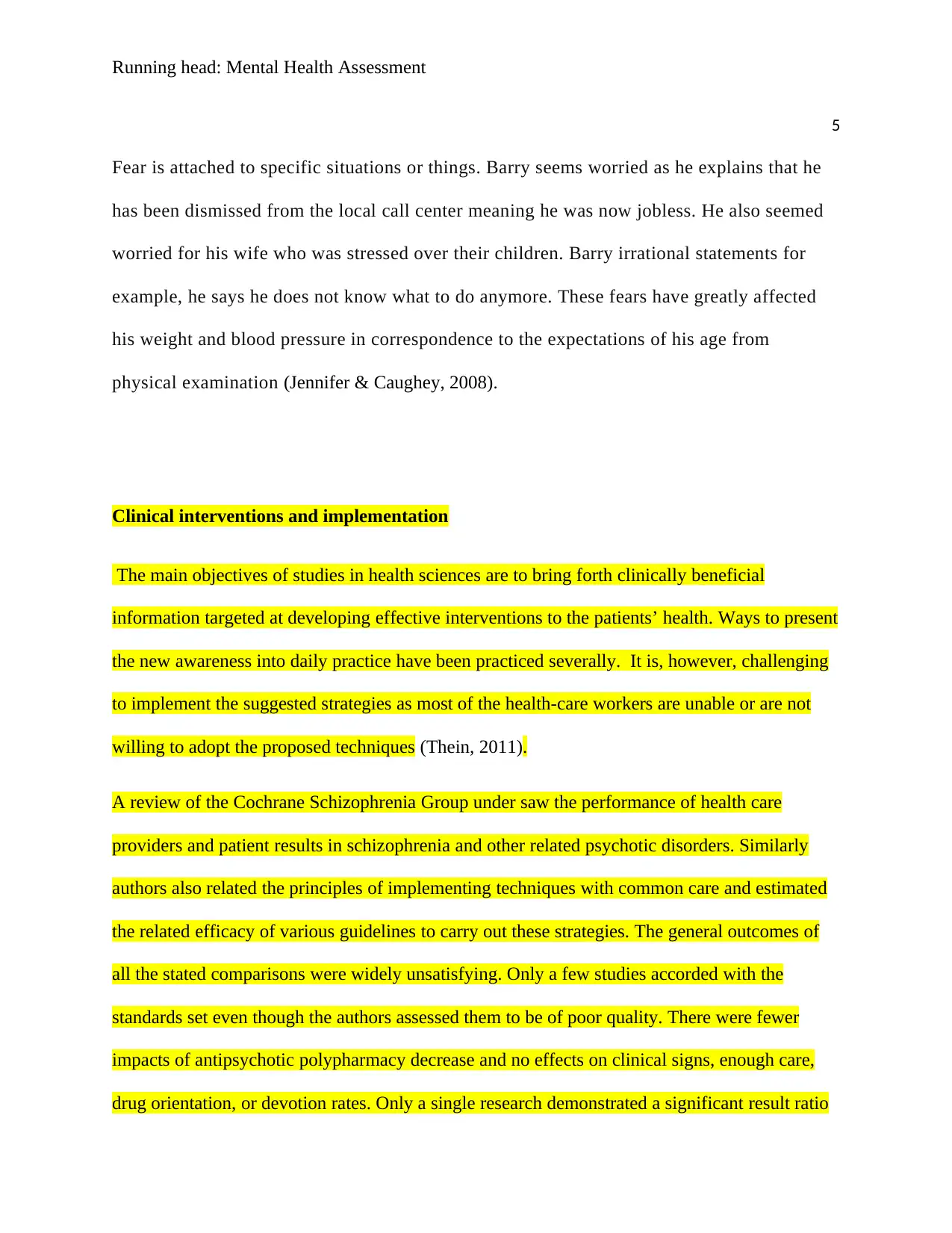
Running head: Mental Health Assessment
5
Fear is attached to specific situations or things. Barry seems worried as he explains that he
has been dismissed from the local call center meaning he was now jobless. He also seemed
worried for his wife who was stressed over their children. Barry irrational statements for
example, he says he does not know what to do anymore. These fears have greatly affected
his weight and blood pressure in correspondence to the expectations of his age from
physical examination (Jennifer & Caughey, 2008).
Clinical interventions and implementation
The main objectives of studies in health sciences are to bring forth clinically beneficial
information targeted at developing effective interventions to the patients’ health. Ways to present
the new awareness into daily practice have been practiced severally. It is, however, challenging
to implement the suggested strategies as most of the health-care workers are unable or are not
willing to adopt the proposed techniques (Thein, 2011).
A review of the Cochrane Schizophrenia Group under saw the performance of health care
providers and patient results in schizophrenia and other related psychotic disorders. Similarly
authors also related the principles of implementing techniques with common care and estimated
the related efficacy of various guidelines to carry out these strategies. The general outcomes of
all the stated comparisons were widely unsatisfying. Only a few studies accorded with the
standards set even though the authors assessed them to be of poor quality. There were fewer
impacts of antipsychotic polypharmacy decrease and no effects on clinical signs, enough care,
drug orientation, or devotion rates. Only a single research demonstrated a significant result ratio
5
Fear is attached to specific situations or things. Barry seems worried as he explains that he
has been dismissed from the local call center meaning he was now jobless. He also seemed
worried for his wife who was stressed over their children. Barry irrational statements for
example, he says he does not know what to do anymore. These fears have greatly affected
his weight and blood pressure in correspondence to the expectations of his age from
physical examination (Jennifer & Caughey, 2008).
Clinical interventions and implementation
The main objectives of studies in health sciences are to bring forth clinically beneficial
information targeted at developing effective interventions to the patients’ health. Ways to present
the new awareness into daily practice have been practiced severally. It is, however, challenging
to implement the suggested strategies as most of the health-care workers are unable or are not
willing to adopt the proposed techniques (Thein, 2011).
A review of the Cochrane Schizophrenia Group under saw the performance of health care
providers and patient results in schizophrenia and other related psychotic disorders. Similarly
authors also related the principles of implementing techniques with common care and estimated
the related efficacy of various guidelines to carry out these strategies. The general outcomes of
all the stated comparisons were widely unsatisfying. Only a few studies accorded with the
standards set even though the authors assessed them to be of poor quality. There were fewer
impacts of antipsychotic polypharmacy decrease and no effects on clinical signs, enough care,
drug orientation, or devotion rates. Only a single research demonstrated a significant result ratio
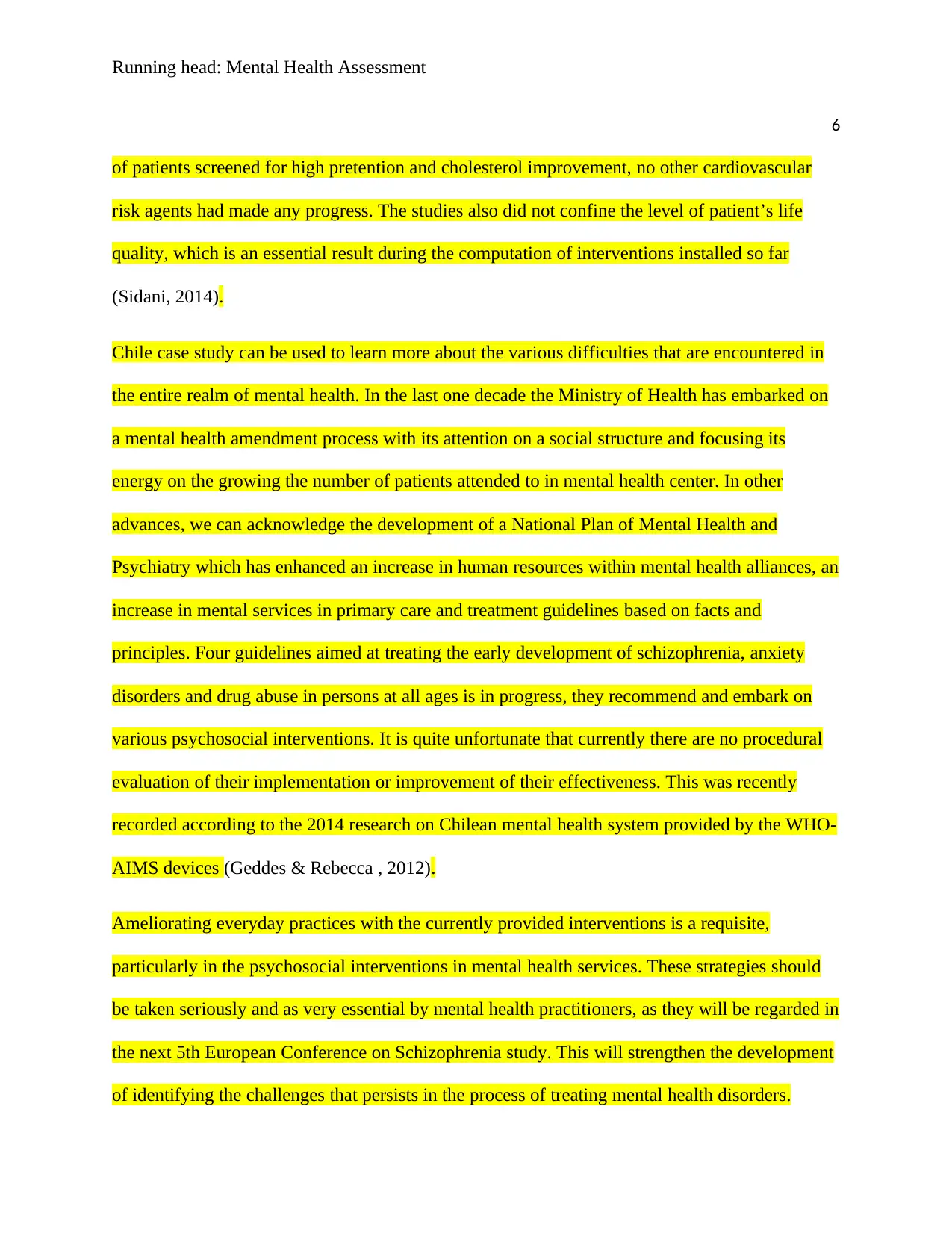
Running head: Mental Health Assessment
6
of patients screened for high pretention and cholesterol improvement, no other cardiovascular
risk agents had made any progress. The studies also did not confine the level of patient’s life
quality, which is an essential result during the computation of interventions installed so far
(Sidani, 2014).
Chile case study can be used to learn more about the various difficulties that are encountered in
the entire realm of mental health. In the last one decade the Ministry of Health has embarked on
a mental health amendment process with its attention on a social structure and focusing its
energy on the growing the number of patients attended to in mental health center. In other
advances, we can acknowledge the development of a National Plan of Mental Health and
Psychiatry which has enhanced an increase in human resources within mental health alliances, an
increase in mental services in primary care and treatment guidelines based on facts and
principles. Four guidelines aimed at treating the early development of schizophrenia, anxiety
disorders and drug abuse in persons at all ages is in progress, they recommend and embark on
various psychosocial interventions. It is quite unfortunate that currently there are no procedural
evaluation of their implementation or improvement of their effectiveness. This was recently
recorded according to the 2014 research on Chilean mental health system provided by the WHO-
AIMS devices (Geddes & Rebecca , 2012).
Ameliorating everyday practices with the currently provided interventions is a requisite,
particularly in the psychosocial interventions in mental health services. These strategies should
be taken seriously and as very essential by mental health practitioners, as they will be regarded in
the next 5th European Conference on Schizophrenia study. This will strengthen the development
of identifying the challenges that persists in the process of treating mental health disorders.
6
of patients screened for high pretention and cholesterol improvement, no other cardiovascular
risk agents had made any progress. The studies also did not confine the level of patient’s life
quality, which is an essential result during the computation of interventions installed so far
(Sidani, 2014).
Chile case study can be used to learn more about the various difficulties that are encountered in
the entire realm of mental health. In the last one decade the Ministry of Health has embarked on
a mental health amendment process with its attention on a social structure and focusing its
energy on the growing the number of patients attended to in mental health center. In other
advances, we can acknowledge the development of a National Plan of Mental Health and
Psychiatry which has enhanced an increase in human resources within mental health alliances, an
increase in mental services in primary care and treatment guidelines based on facts and
principles. Four guidelines aimed at treating the early development of schizophrenia, anxiety
disorders and drug abuse in persons at all ages is in progress, they recommend and embark on
various psychosocial interventions. It is quite unfortunate that currently there are no procedural
evaluation of their implementation or improvement of their effectiveness. This was recently
recorded according to the 2014 research on Chilean mental health system provided by the WHO-
AIMS devices (Geddes & Rebecca , 2012).
Ameliorating everyday practices with the currently provided interventions is a requisite,
particularly in the psychosocial interventions in mental health services. These strategies should
be taken seriously and as very essential by mental health practitioners, as they will be regarded in
the next 5th European Conference on Schizophrenia study. This will strengthen the development
of identifying the challenges that persists in the process of treating mental health disorders.
⊘ This is a preview!⊘
Do you want full access?
Subscribe today to unlock all pages.

Trusted by 1+ million students worldwide
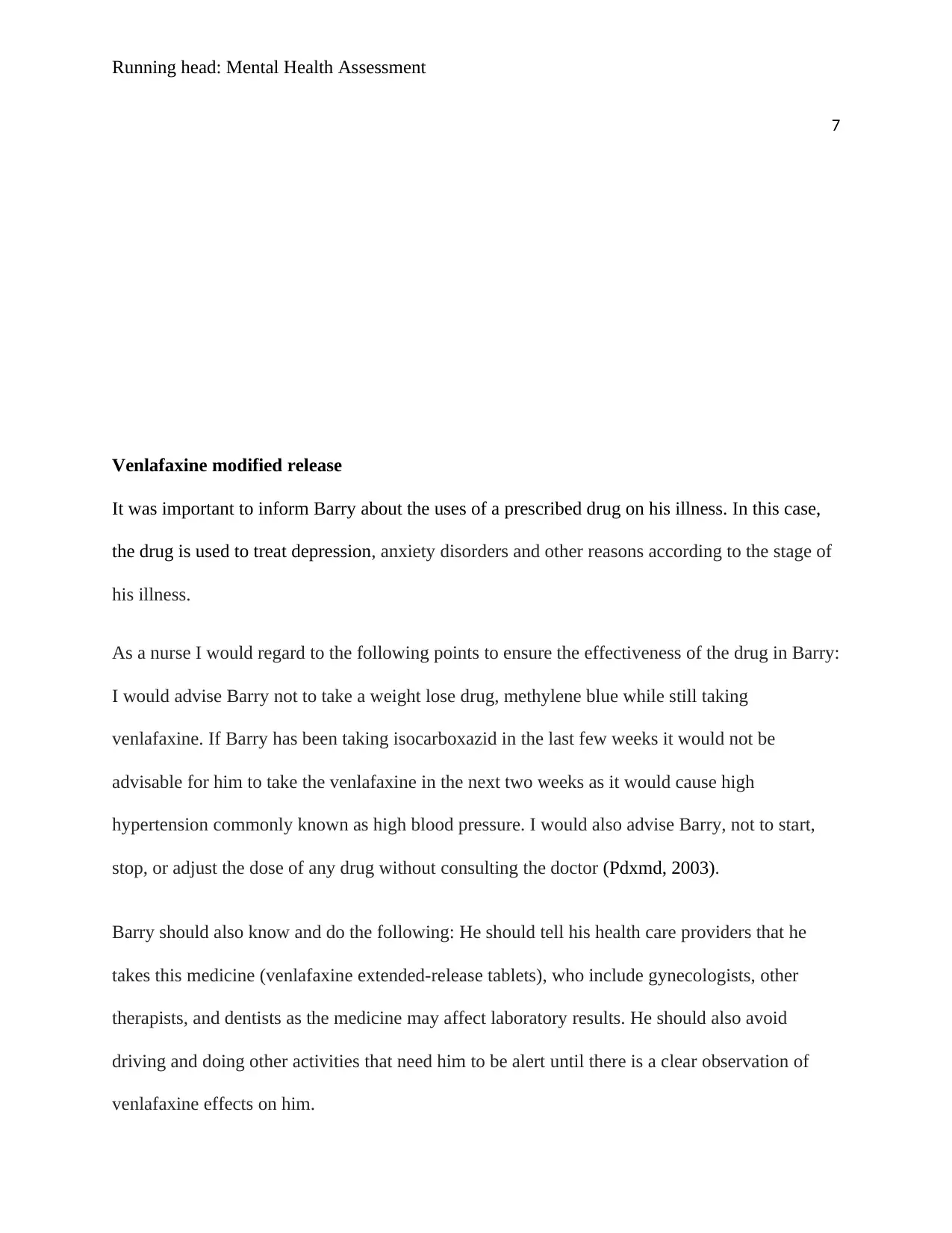
Running head: Mental Health Assessment
7
Venlafaxine modified release
It was important to inform Barry about the uses of a prescribed drug on his illness. In this case,
the drug is used to treat depression, anxiety disorders and other reasons according to the stage of
his illness.
As a nurse I would regard to the following points to ensure the effectiveness of the drug in Barry:
I would advise Barry not to take a weight lose drug, methylene blue while still taking
venlafaxine. If Barry has been taking isocarboxazid in the last few weeks it would not be
advisable for him to take the venlafaxine in the next two weeks as it would cause high
hypertension commonly known as high blood pressure. I would also advise Barry, not to start,
stop, or adjust the dose of any drug without consulting the doctor (Pdxmd, 2003).
Barry should also know and do the following: He should tell his health care providers that he
takes this medicine (venlafaxine extended-release tablets), who include gynecologists, other
therapists, and dentists as the medicine may affect laboratory results. He should also avoid
driving and doing other activities that need him to be alert until there is a clear observation of
venlafaxine effects on him.
7
Venlafaxine modified release
It was important to inform Barry about the uses of a prescribed drug on his illness. In this case,
the drug is used to treat depression, anxiety disorders and other reasons according to the stage of
his illness.
As a nurse I would regard to the following points to ensure the effectiveness of the drug in Barry:
I would advise Barry not to take a weight lose drug, methylene blue while still taking
venlafaxine. If Barry has been taking isocarboxazid in the last few weeks it would not be
advisable for him to take the venlafaxine in the next two weeks as it would cause high
hypertension commonly known as high blood pressure. I would also advise Barry, not to start,
stop, or adjust the dose of any drug without consulting the doctor (Pdxmd, 2003).
Barry should also know and do the following: He should tell his health care providers that he
takes this medicine (venlafaxine extended-release tablets), who include gynecologists, other
therapists, and dentists as the medicine may affect laboratory results. He should also avoid
driving and doing other activities that need him to be alert until there is a clear observation of
venlafaxine effects on him.
Paraphrase This Document
Need a fresh take? Get an instant paraphrase of this document with our AI Paraphraser
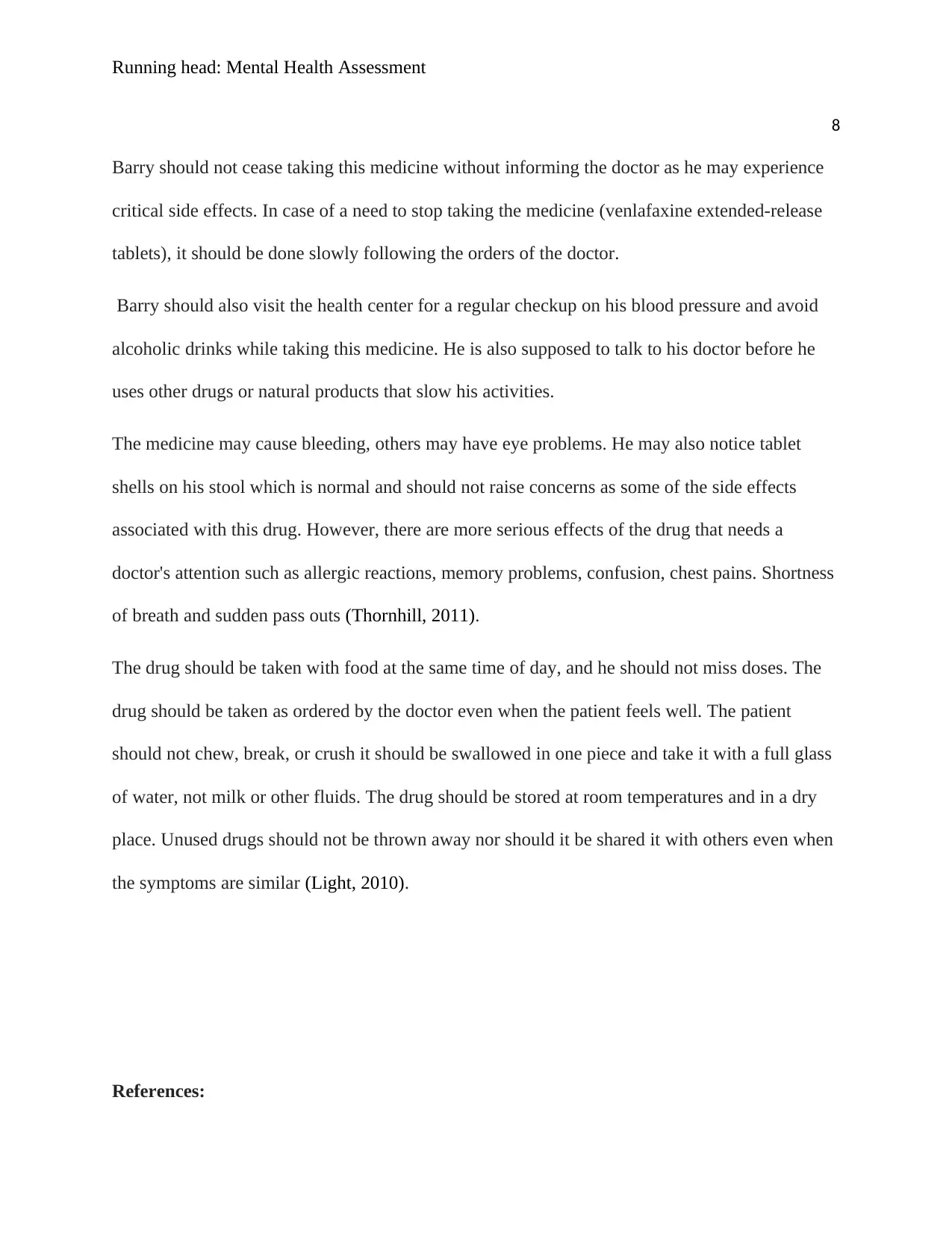
Running head: Mental Health Assessment
8
Barry should not cease taking this medicine without informing the doctor as he may experience
critical side effects. In case of a need to stop taking the medicine (venlafaxine extended-release
tablets), it should be done slowly following the orders of the doctor.
Barry should also visit the health center for a regular checkup on his blood pressure and avoid
alcoholic drinks while taking this medicine. He is also supposed to talk to his doctor before he
uses other drugs or natural products that slow his activities.
The medicine may cause bleeding, others may have eye problems. He may also notice tablet
shells on his stool which is normal and should not raise concerns as some of the side effects
associated with this drug. However, there are more serious effects of the drug that needs a
doctor's attention such as allergic reactions, memory problems, confusion, chest pains. Shortness
of breath and sudden pass outs (Thornhill, 2011).
The drug should be taken with food at the same time of day, and he should not miss doses. The
drug should be taken as ordered by the doctor even when the patient feels well. The patient
should not chew, break, or crush it should be swallowed in one piece and take it with a full glass
of water, not milk or other fluids. The drug should be stored at room temperatures and in a dry
place. Unused drugs should not be thrown away nor should it be shared it with others even when
the symptoms are similar (Light, 2010).
References:
8
Barry should not cease taking this medicine without informing the doctor as he may experience
critical side effects. In case of a need to stop taking the medicine (venlafaxine extended-release
tablets), it should be done slowly following the orders of the doctor.
Barry should also visit the health center for a regular checkup on his blood pressure and avoid
alcoholic drinks while taking this medicine. He is also supposed to talk to his doctor before he
uses other drugs or natural products that slow his activities.
The medicine may cause bleeding, others may have eye problems. He may also notice tablet
shells on his stool which is normal and should not raise concerns as some of the side effects
associated with this drug. However, there are more serious effects of the drug that needs a
doctor's attention such as allergic reactions, memory problems, confusion, chest pains. Shortness
of breath and sudden pass outs (Thornhill, 2011).
The drug should be taken with food at the same time of day, and he should not miss doses. The
drug should be taken as ordered by the doctor even when the patient feels well. The patient
should not chew, break, or crush it should be swallowed in one piece and take it with a full glass
of water, not milk or other fluids. The drug should be stored at room temperatures and in a dry
place. Unused drugs should not be thrown away nor should it be shared it with others even when
the symptoms are similar (Light, 2010).
References:
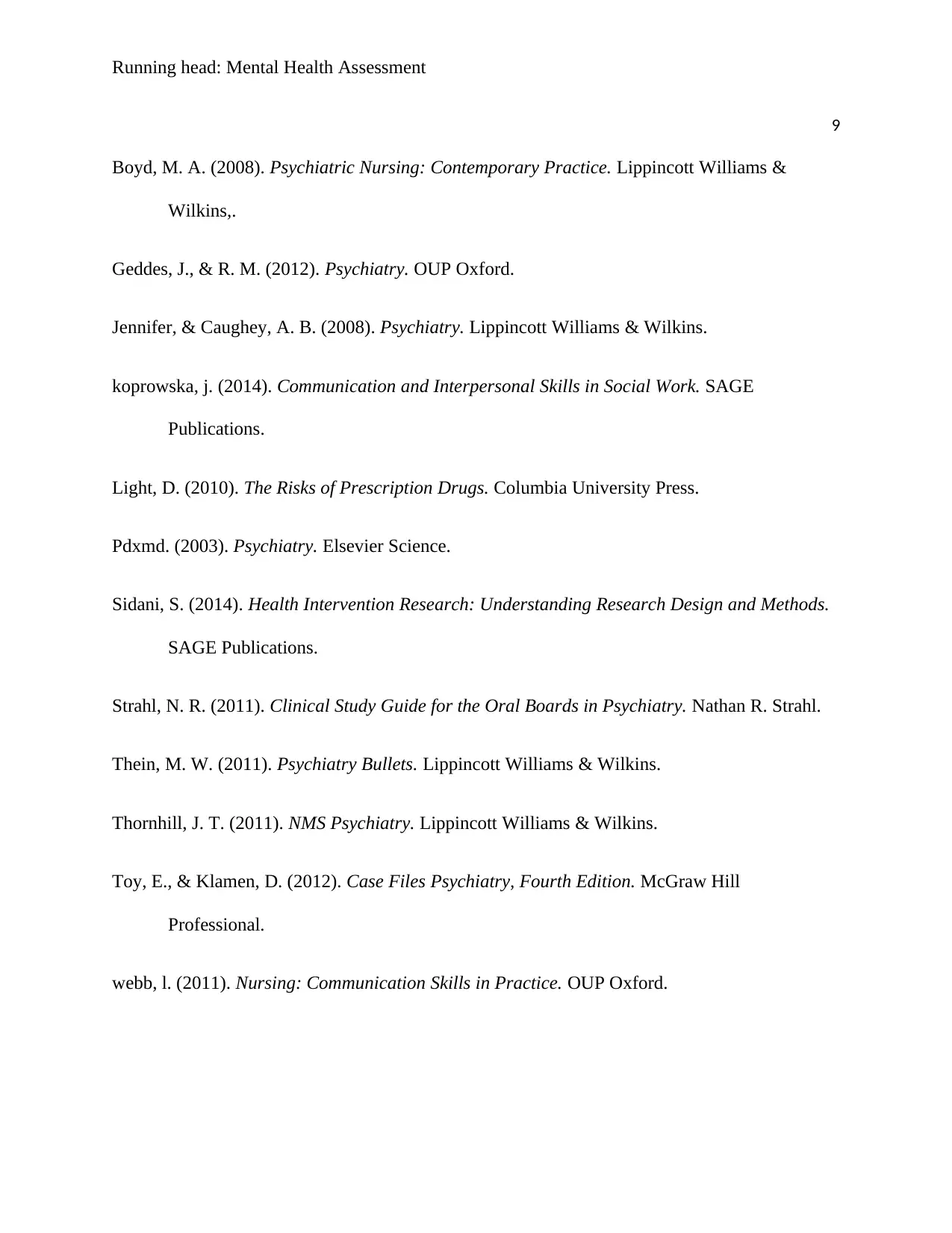
Running head: Mental Health Assessment
9
Boyd, M. A. (2008). Psychiatric Nursing: Contemporary Practice. Lippincott Williams &
Wilkins,.
Geddes, J., & R. M. (2012). Psychiatry. OUP Oxford.
Jennifer, & Caughey, A. B. (2008). Psychiatry. Lippincott Williams & Wilkins.
koprowska, j. (2014). Communication and Interpersonal Skills in Social Work. SAGE
Publications.
Light, D. (2010). The Risks of Prescription Drugs. Columbia University Press.
Pdxmd. (2003). Psychiatry. Elsevier Science.
Sidani, S. (2014). Health Intervention Research: Understanding Research Design and Methods.
SAGE Publications.
Strahl, N. R. (2011). Clinical Study Guide for the Oral Boards in Psychiatry. Nathan R. Strahl.
Thein, M. W. (2011). Psychiatry Bullets. Lippincott Williams & Wilkins.
Thornhill, J. T. (2011). NMS Psychiatry. Lippincott Williams & Wilkins.
Toy, E., & Klamen, D. (2012). Case Files Psychiatry, Fourth Edition. McGraw Hill
Professional.
webb, l. (2011). Nursing: Communication Skills in Practice. OUP Oxford.
9
Boyd, M. A. (2008). Psychiatric Nursing: Contemporary Practice. Lippincott Williams &
Wilkins,.
Geddes, J., & R. M. (2012). Psychiatry. OUP Oxford.
Jennifer, & Caughey, A. B. (2008). Psychiatry. Lippincott Williams & Wilkins.
koprowska, j. (2014). Communication and Interpersonal Skills in Social Work. SAGE
Publications.
Light, D. (2010). The Risks of Prescription Drugs. Columbia University Press.
Pdxmd. (2003). Psychiatry. Elsevier Science.
Sidani, S. (2014). Health Intervention Research: Understanding Research Design and Methods.
SAGE Publications.
Strahl, N. R. (2011). Clinical Study Guide for the Oral Boards in Psychiatry. Nathan R. Strahl.
Thein, M. W. (2011). Psychiatry Bullets. Lippincott Williams & Wilkins.
Thornhill, J. T. (2011). NMS Psychiatry. Lippincott Williams & Wilkins.
Toy, E., & Klamen, D. (2012). Case Files Psychiatry, Fourth Edition. McGraw Hill
Professional.
webb, l. (2011). Nursing: Communication Skills in Practice. OUP Oxford.
⊘ This is a preview!⊘
Do you want full access?
Subscribe today to unlock all pages.

Trusted by 1+ million students worldwide
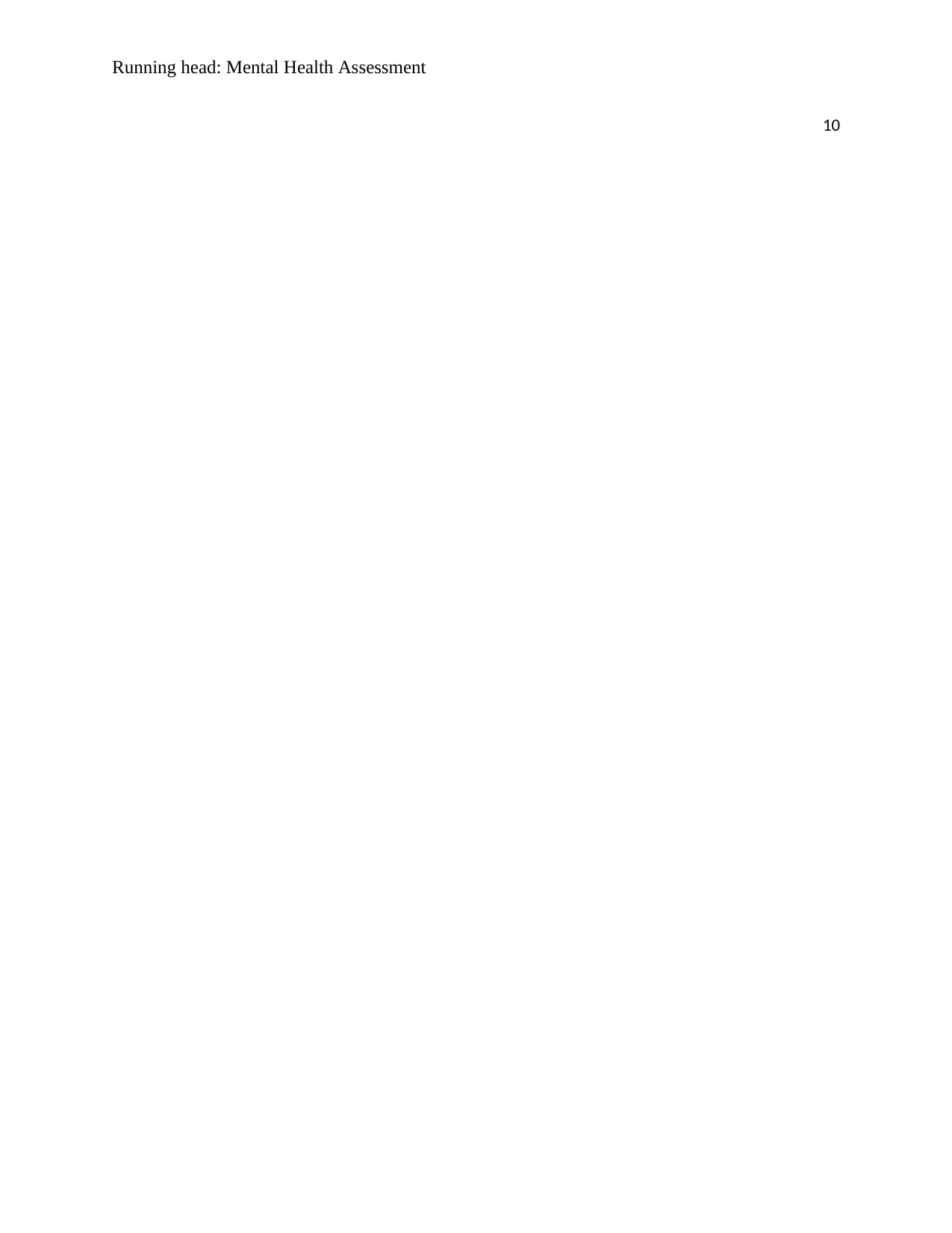
Running head: Mental Health Assessment
10
10
1 out of 10
Related Documents
Your All-in-One AI-Powered Toolkit for Academic Success.
+13062052269
info@desklib.com
Available 24*7 on WhatsApp / Email
![[object Object]](/_next/static/media/star-bottom.7253800d.svg)
Unlock your academic potential
© 2024 | Zucol Services PVT LTD | All rights reserved.





